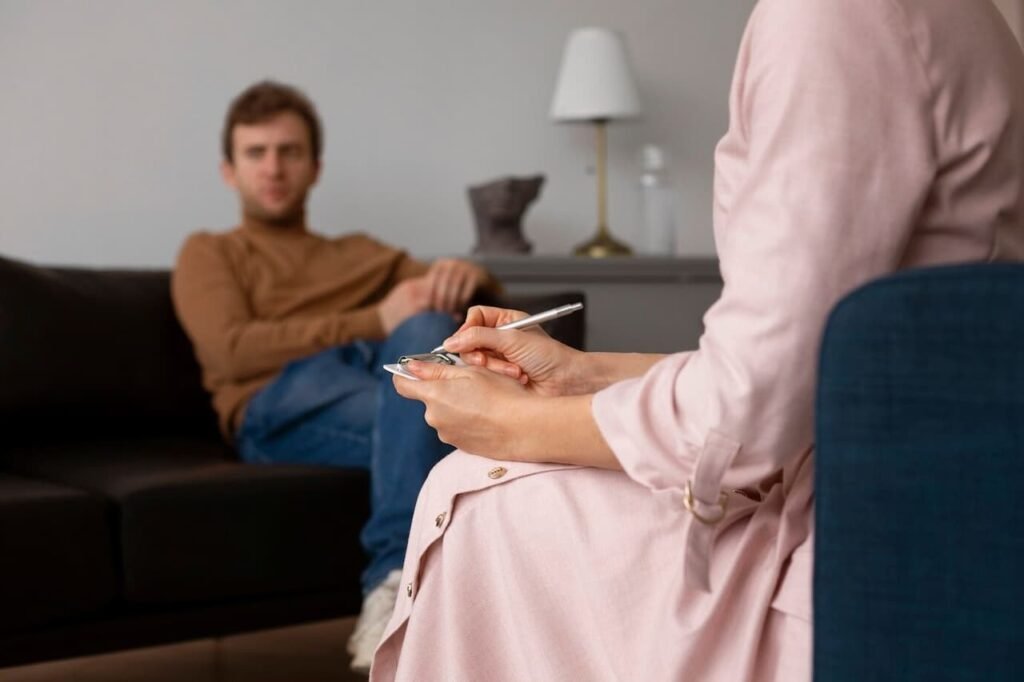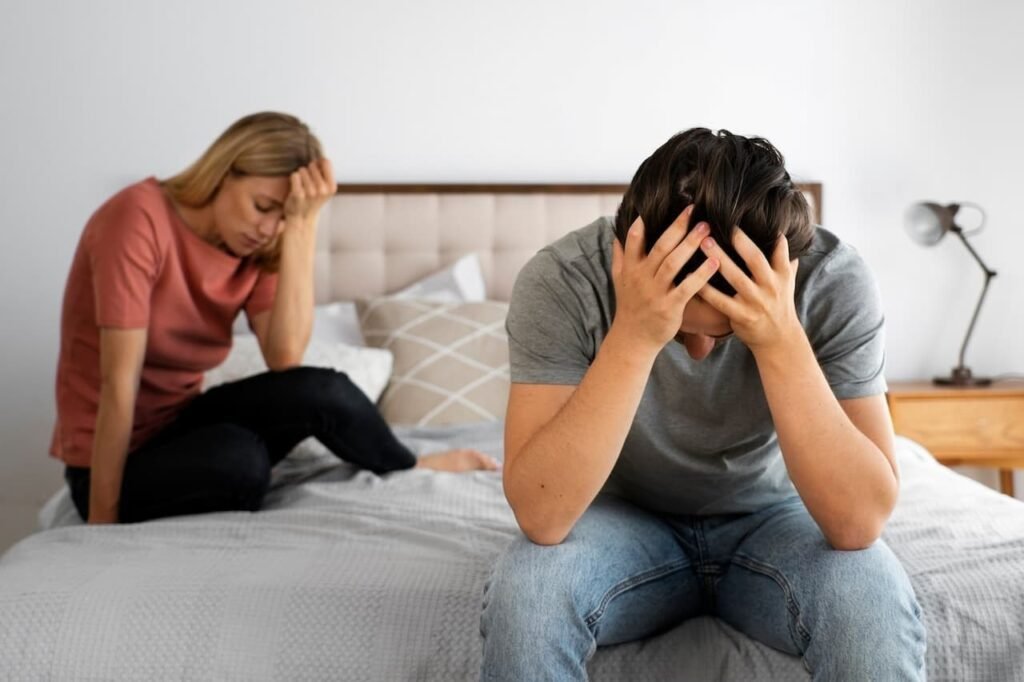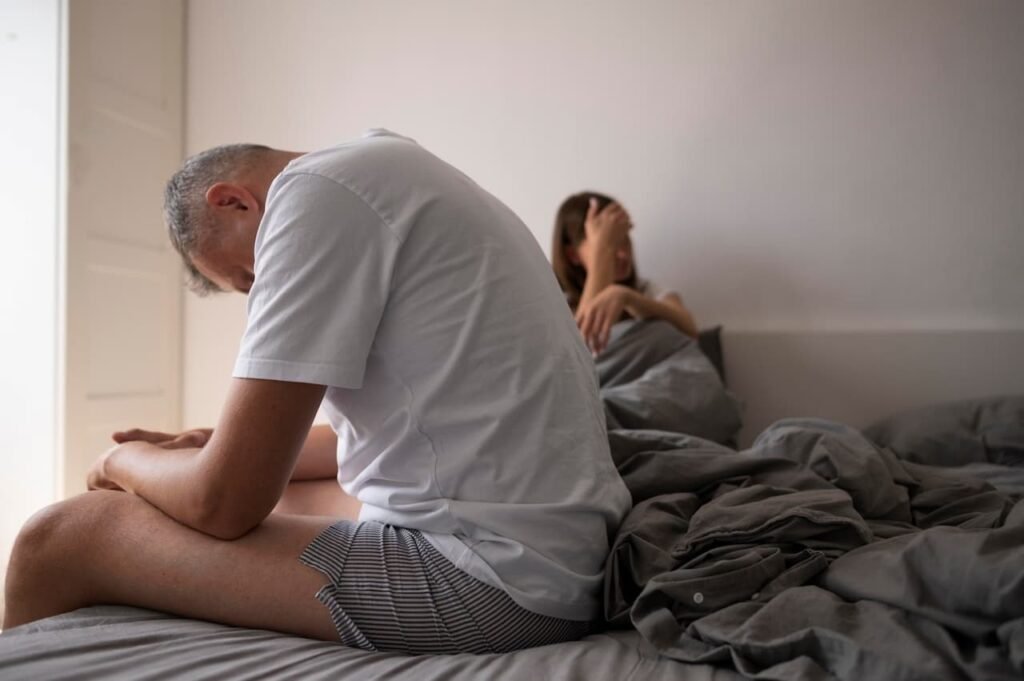Sex Counselling is an approach in which medical, psychological and personal issues are addressed which are impacting one’s sexual satisfaction. It helps individuals and couples in dealing with various medical, psychological and interpersonal factors associated with sexual aspect of the life. Sex Counselling helps people in moving on from physical and psychological challenges and have a pleasurable and satisfying sex life with the partner.
Table of Contents
ToggleThe problems and the challenges that people might be facing are discussed and resolved with full guidance from the counsellor in the session. The length and frequency of the session depends on the clients and the problems that they came with in the session. Most of the times, clients feel anxious and scared when they start seeking sex counselling because they have to discuss their personal experiences with someone else who is a total stranger for them. But overtime, that anxiety fades away when the positive results are seen in the counselling sessions.

Who is a Sex Counsellor?
A Sex Counsellor is a licensed professional who helps with mental and emotional aspects of sexual issues faced by anyone. They have a deep knowledge about human sexuality and use psychotherapy to help the clients with various sexual issues. They work with individuals and couples both. A sex counsellor could be a medical doctor, a psychologist or a social worker but must have training in sexual health and sexual problems.
They deal with various problems like sexual dysfunctions, performance anxiety, sexual disorder and gender identity disorder. They also help with life and relationship issues which are related to the sexual aspect of life. And it is the responsibility of the sex counsellor to make sure that the environment in which the session is taking place is non-judgmental, safe and supportive.
Sex Counsellors ensure confidentiality and maintains the privacy of the client as personal information is shared with the counsellor in the session. And they are also expected to keep everything confidential as it is a part of their professional code of ethics. Also, counsellor who don’t ensure confidentiality and break the ethical code risk their license and ability to practice in the future as well.

Why Sex Counselling is needed?
Sexual activity is a complex experience which has several components like emotional, mental and even physical. But sexual function is a very important thing for a good quality of relationship in the long run as it is linked with physical well-being, mental well-being and relationship satisfaction. Sexual activity has been divided into 4 phases:
- Desire
- Arousal
- Orgasm
- Resolution

Thus, sexual issue can arise at any phase and it can be resolved with the help of a sex counsellor. Someone might experience any of the following problems for which sex counselling will be necessary and they have been mentioned here:
- Erectile Dysfunction
- Low Libido
- Premature ejaculation
- Excessive Libido
- Unwanted and Asocial sexual fetishes
- Lack of interest
- Unable to control sexual thoughts
- Low Self-esteem
- Inability to achieve orgasm
- Distressing sexual thoughts
To even determine that you really need sex counselling or not is to identify what parts of your life are getting affected the most by your sex related issues. If your quality of life, emotional health and mental health are deteriorating due to sexual dysfunction or dissatisfaction, then it will be a good decision to consult a sex counsellor. Also, if intimacy issue and miscommunication related to sexual needs is happening in the relationship, then, also sex counselling really helps.
What actually happens in Sex Counselling?
In Sex Counselling sessions, the counsellor helps the couple to discuss their sexual issues or problems so that it can be addressed and resolved in better ways. It is not necessary that only a couple could take sex counselling but an individual also can seek sex counselling for the treatment of their sexual issues.
Initial assessment is done before starting the sex counselling sessions so that proper information can be obtained. The history of the relationship, current update of the relationship, nature of sexual problems, couple’s perspectives about the sexual problems, attitudes about sexuality, previous treatment, and expectations from sex counselling sessions. It is very important for the counsellor to make the couple feel comfortable as discussing about one’s sexual problems can arise feelings of guilt, shame and fear. And these negative feelings can highly impact the treatment in the counselling sessions. So, the sex counsellor encourages or motivates the couple to talk about their sexual problems and move on from them.

Childhood experiences also impact one’s sexuality a lot so those experiences are also discussed and taken into consideration in the sex counselling sessions. Sometimes, people are abused and bullied in their childhood which negatively impacts how they perceive and develop interpersonal relationships and form their sexuality in adulthood. If effects of negative childhood experiences persist till adulthood, then it can even turn into infidelity which is a serious concern for individuals in a relationship. Also, parent’s marital status, the kind of relationship parents had and attitudes towards sexuality are all discussed with the counsellor.
After the initial session of talking with the couple or an individual, a physical examination is also recommended which is very important to be done. It is not done by the sex counsellor but by a medical doctor who is licensed to do the examination. If the complaint of the client is serious, a physical exam is usually required. The most common problems are sexual pain disorder (e.g. vaginismus, dyspareunia); erectile dysfunction; or addiction of masturbation. The physical examination provides important insight into the causes and nature of the sexual problems.
This can help the sex counsellor to look into the results of the physical examination and thus choose the strategies to be used in the counselling session. Thus, the sex counsellor makes a strategy to resolve the sexual problems. Also, if the reason behind a sex related problem is totally a physical one then those clients are recommended to a medical doctor. But according to researches, getting treatment from both the medical doctor and a sex counsellor helps in addressing the issue and reach towards the goal quickly.

People besides sexual problems like erectile disorder and arousal disorder they also face issues related to self-image, sexual identity, relationships and gender role developments. Then, in the counselling sessions, these problems are explored when counsellor and the client interacts and establish a trustful connection so that everything can be shared with the counsellor. Thus, counsellor uses various cognitive behavioural strategies and techniques to help the clients modify their irrational cognitive distortions and replace them with rational and logical ones. Client’s thinking patterns are recognized, understood and changed positively.
Talking about sex and problems being faced in the sex life so counsellors do their best to make the clients feel comfortable. Also, sex counsellors give homework to the couple or an individual to do at home in their own personal space that will be beneficial for them. This totally depends upon the individual or couple and how they want the homework to be designed so that their communication and relationship both can be improved.
Such homework could be like experimentation which is suggested when a couple faces a sexual rut and are told to try different things like role play and sex toys to increase the excitement in the relationship. Because sometimes a little change is necessary to get out of the monotonous routine. Another homework could be education like getting proper knowledge about sexual activity, how it’s done and important things to consider. All of this information is important to have so that it can be used by the individuals to improve the quality of their sexual life.
Then there are communication strategies which are taught in the counselling sessions by the counsellors but are asked to practice this at home also to bring them into their habits. Individuals practice how to express what they want or need sexually in their relationship. Also there is something called sensate focus which is designed to build trust and intimacy between the individuals in the relationship. In this, they have to start with nonsexual touching, genital touching and ending with penetration.
Problems resolved in Sex Counselling
Sex Counsellors can help you with:
- Sex education and correcting any misinformation
- Feelings of anxiety, shame or guild related to sexual issues
- Addressing issues related to gender identity and sexual orientation
- Teaching about perspectives of sex
- Improving communication about sex and intimacy between the couple
- Solving relationship issues arising from sexual problems
- Correcting miscommunication about sexual need between the individuals who are in a relationship
- Pornography addiction
- Masturbation addiction
- Gain an understanding of sex and pleasure
- Identify and address underlying reasons of sexual issues

Case Study Example
Christian is a 30 year old man who has diabetes for 5 years and developed erectile dysfunction 3 years ago. He used to be pornography addicted and spent majority of his time engaging in this addiction only. This addiction really impacted his professional life and even romantic life/relationship negatively. He consulted a number of medical professionals, underwent a lot of tests but nothing significant came out of those tests. So, one day he decided that he should consult a mental health professional regarding this situation when he was sick and tired of this problem.
Overtime, through the sessions his exhaustion and cognitions formed related to sex were corrected and he was also taught relaxation techniques to help him calm down his anxiety and fear. And then, he also discussed the breakup story with the counsellor which he kept hidden and never shared it with anyone. It was a stressful time for him when the relationship ended. After several sessions, he progressed and his problem of erectile dysfunction began to decrease.

Visit Medavas for Sex Counselling Sessions from Experts
It is considered a taboo to seek counselling for sex related issues but still is very important to do. And also sex counselling must be given by those who are unbiased and sensitive towards sex related concerns that are faced by people. Counsellors available at our website Medavas are skilled, experienced and empathetic towards client’s needs and problems.
Those counsellors have been taking counselling sessions since a long time and are expert in dealing with sex related issues. So, if you feel like you need help and support from someone due to any sex related concern then do visit our website Medavas and seek help from professionals.

Frequently Asked Questions (FAQs) for Sex Counselling
Is Sex Counselling necessary for Sexual Dysfunction?
Sexual dysfunction can cause problems in relationships, loss of confidence, or other negative consequences which can even end the relationship. So, Sex counselling is an effective approach that treats and eliminates underlying issues caused in the sexual life of the client. These concerns could be physical, emotional or mental. Individuals and couples can seek sex counselling to find a way of having open and honest communication.
What are the Benefits of Sex Counselling?
Sex Counselling promotes fulfilling sex life which is essential for the overall health of a person. A healthy sex lifestyle has many benefits like it lowers blood pressure, promotes better health, and reduces stress. Also, Sex is also a fun, natural part of our lives. Sex Counselling will allow them to work through their sexual issues and challenges towards a happy and healthy sex life.
What are the various types of therapies for sex related issues?
When the problems are more serious, then therapy is recommended to them to treat all the problems. Various types of therapies for sex related issues are available like Talk therapy; Cognitive behavioural therapy; Mindfulness-based interventions; Interpersonal Therapy and Emotion-based therapy.